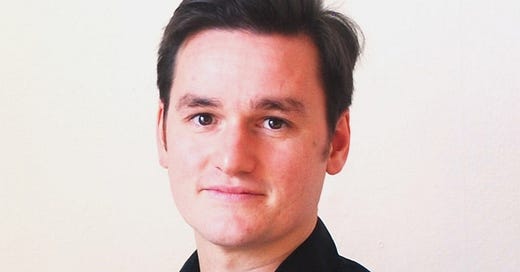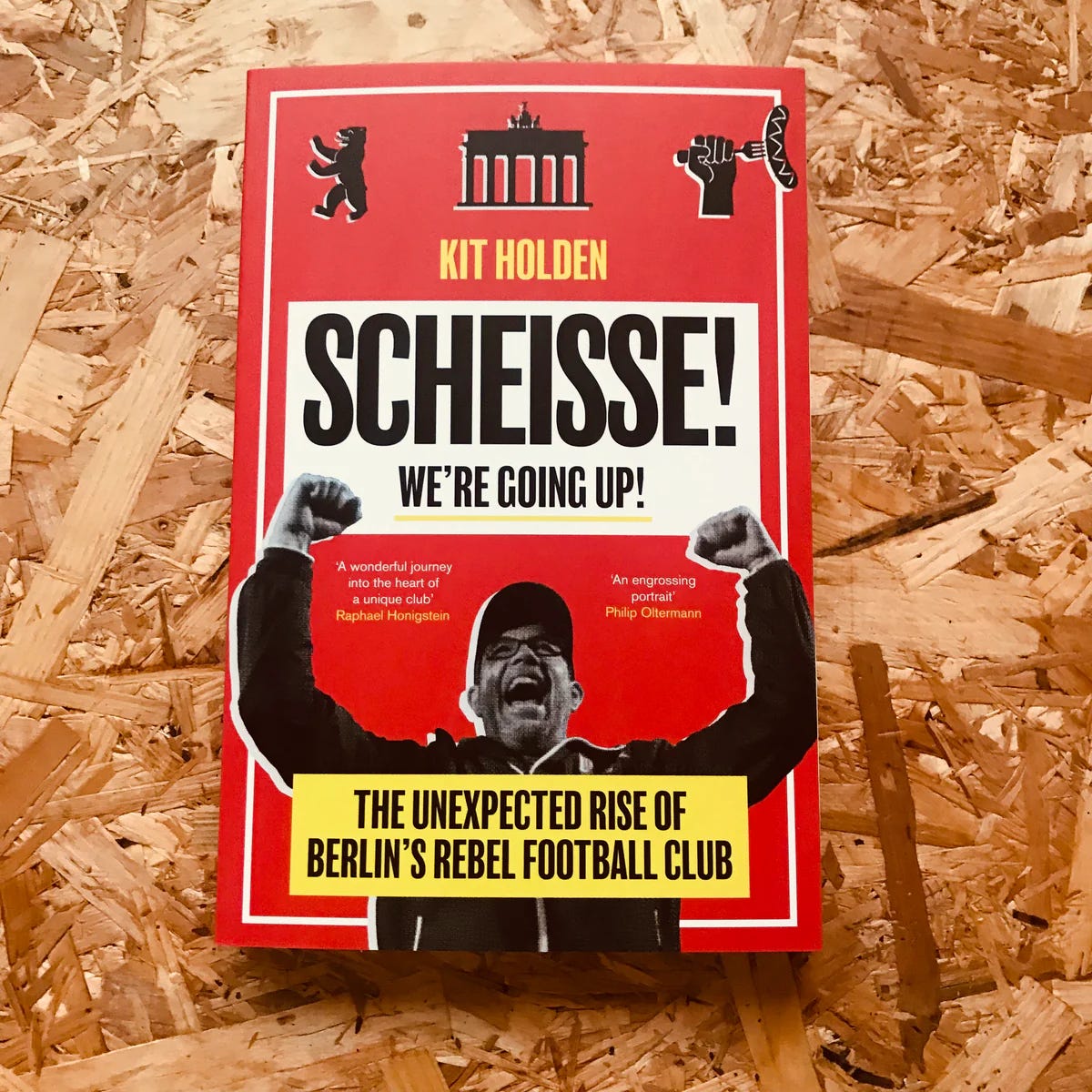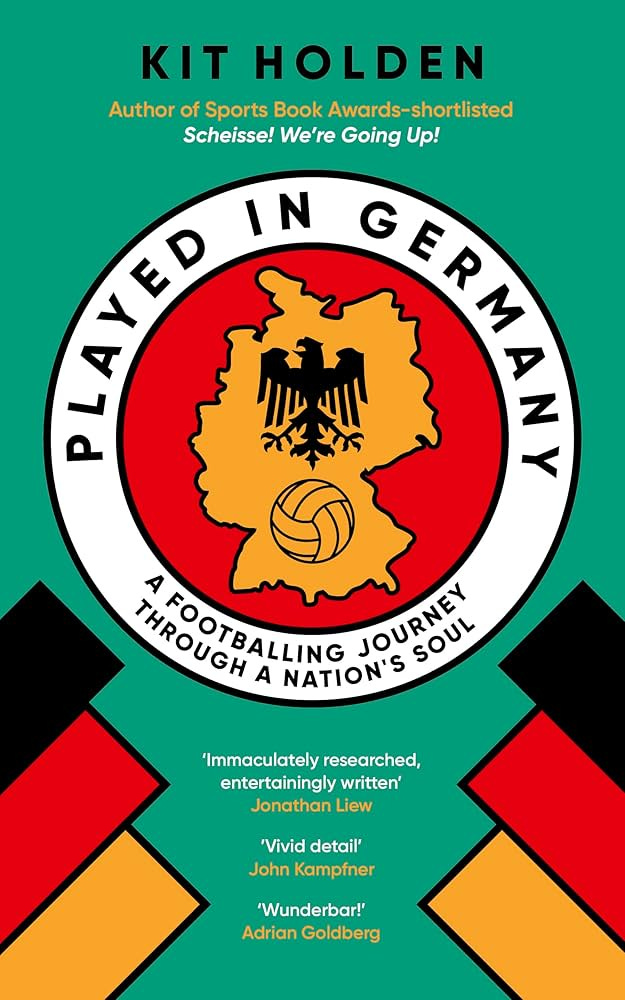Fascinated by German football from a young age, Kit Holden has carved a unique career since he's moved to Berlin.
A freelance journalist writing in both German and English for titles such as Der Taggespiegel and The Athletic, Holden has recently published two outstanding books.
Scheisse! We're Going Up!, tells the story of Union Berlin through the stories of Unioner dating back to the days of the DDR. Played In Germany, published in June of this year, explores the football history and cultures of the host cities of Euro 2024.
You can listen to the podcast in full here, or read on for some edited excerpts from my conversation with Kit.
You can also subscribe to the Bundesletter Podcast on Spotify, Apple Podcasts and all major podcast platforms.
What brought you to Berlin?
I’ve said it publicly enough, I grew up a Bayern fan. I had family in Munich growing up, so I had a Bayern shirt on when I watched the ‘99 Champions League as a five year old on my living room floor in Northamptonshire. My dad celebrated, even though he wasn’t a United fan, just because of how amazing a moment it was. I was bawling my eyes out. That cemented in me quite an early love of German football and a loyalty to German football.
I then studied German at uni. When I did my year abroad, I’d kind of already started writing a bit, and I did a placement at a newspaper here (Der Tagesspiegel) and basically stayed ever since.
I wanted to ask you if your relationship to Union has changed since covering the club as a journalist, but you’ve turned up wearing an Union t-shirt…
[Laughs] If you’re covering something for independent media you have to be neutral and you have to be critical.
I always have to make sure that I’m not being too friendly towards the club, but also I’m not overcompensating and going too hard on them. Technically I’m a beat reporter, but I’m also freelance and part time. Apart from last season, there’s been very little to criticise, which has made made it easier.
I’ve never found it hard to switch modes. That’s part of the joy of being a football fan, especially at Union. You lose yourself for 90 minutes, you aren’t being advertised at, you’re in this massive throng people, you’re singing, you’re shouting. I’m a fan inside the stadium, I’m kind of a different person.
As for the t-shirt? [Laughs] Anyone who knows me will tell you I just wear football shirts every day…
What’s the difference between writing in English and in German? Does it exercise different parts of your brain?
Necessarily so. I’m a native English speaker. Yes, I learned German from an early age, and I’m near native fluency, but it’s not my mother tongue. It can be restrictive, which in some ways is quite liberating, but the structure also gives you a challenge.
I like coming back to writing in German after a bit of writing in English, and I like the relief of just being able to write in my mother tongue too.
It’s a great strength to be slightly from the outside… It can give you a slightly different angle or way of looking at things.
In Scheisse! you say ‘Union aren’t a monolith’ in relation to the ideas or projections that have been put onto the club in recent times…
There are lots of different generalisations. In the Anglo-world, there’s an idea of Union as a ‘Berlin St.Pauli’, the hipster club. By extension people think it’s really left wing with a super diverse fanbase. In many ways it is, but it’s also very much a working class club from the outskirts of East Berlin.
I tried to get a warts and all picture of the club across. I wanted it to be honest, and if not comprehensive, then at least a representative portrait of the club as it actually is.
Whoever I speak to, whatever their background, they tend to say, ‘look, the point of this club is not to be political or not to represent something beyond what it is.’ It’s a community club where people can come on their Saturday, and they can be free, they can fully identify fully with the people around them, whether they’re of that community, or they’ve been accepted by it.
Played in Germany looks at the different fan cultures around the country. Is it fair to say, the idea of Germany as a footballing nation doesn’t really exist in the same way as in other countries?
This is a federal country, and traditionally a very decentralised country. In the 153 years since it was first unified, its borders have changed. It’s gone through countless different political systems. The continuity people have in their identity is much more regionally based.
The country is bordered by nine others, all of whom have different languages and different histories. There’s always going to be a certain amount of regional diversity. That said, there’s always a little bit of narcissm of small differences. "Everywhere you go, you ask: 'what makes your region so special?' And they say, 'we've got this great beer, this great sausage, and the people here are really friendly.'"
There are some shared threads which all Germans share, but because of these historical factors, there will always be regionality, which is reflected in the football.
You start the book in Leipzig. Most English readers might not know the story of the city outside of Red Bull.
I’ve always had a soft spot for Leipzig football, exactly for that reason.
I wanted it to be the first chapter because it gets to the heart of lots of key issues in German football and Germany.
You have east versus west, which is a hugely important starting point to understand modern Germany. You’ve got the way Germany and its history has changed over the past 100 years. In terms of fan culture, you’ve got RB Leipzig and fan ownership, but you also have these two grand old clubs (Lokomotive Leipzig and Chemie Leipzig) one of whom was the first ever German champion (Lok then known as VfB Leipzig won the inagural German title in 1903) and can trace its history back to the founding days of the sport in the country.
You have their story during the Second World War, their rise again during the Cold War, and then their plummet after reunification. You have all these stories converging, alongside the fact that Leipzig is where the DFB was founded. It’s the birthplace of German football. That was the idea, to say this is the starting point if you want to know about German football.
You touch upon the unease many feel in waving the flag, or feeling overly patriotic given the atrocities that have occurred in this country. How did that manifest during the tournament?
The debate around nationalism and patriotism is changing. There is now an established far right party in the German political spectrum.
That flag waving was seen as problematic. There’s been huge debate around that, as to whether it’s ever appropriate to feel good about that patriotic fervour. In 2006 (during the World Cup hosted in Germany, the last major men’s tournament hosted in the country, and its first since reunification) it was so unusual. There was some hope that it would bring a positive wave of nationalism, like Britain had in the 90s around Cool Britannia.
There’s a credible argument that says a result of the 2006 wave of patriotism led to the door opening for a more traditional form of hard right jingoism.
What role does football play in resisting this surge of populism in Germany?
Everybody has their role, but sometimes politics or fans demand too much from sport to say something about political issues.
These clubs need to take a stand, but avoid the symbolic token gestures. That’s not to say rainbow armbands or taking the knee is tokenism, that stuff is very important.
More important is different actors behave in a way they actually want to see in society. For clubs that might mean investing in prevention when they see dangerous behaviours in their base. German clubs do that well for the most part.
Football and sport has to take a collective and institutional responsibility, but individuals also have to act with individual responsibility too.












Share this post